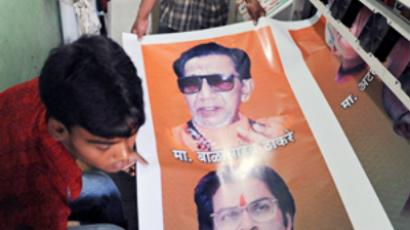Japan’s new prime minister to tackle old challenges
The newly elected prime minister of Japan vowed to improve relations with Russia and resolve the territorial dispute over the Kuril Islands, though Moscow says his stance on the issue is still too extreme.
Former Prime Minister Taro Aso resigned with his cabinet, paving the way for the first change in Japan’s government in 15 years. Western mass media has already dubbed Japan’s new prime minister, Yukio Hatoyama, as “a bracingly unusual Japanese leader,” “political blue blood” and even “the Alien.”
With Japan facing its worst economic slowdown since World War II, the ex-opposition leader promises to reinvigorate the economy. He also wants to shake up the government with his left-of-center party after more than 50 years of almost unbroken conservative rule.
“It was a bit similar to what Obama was doing in the US – the main motto of the campaign was change,” said Vasily Mikheev, director of the China-Japan Center at the Institute of World Economy and International Relations. “The Japanese were promised something new, and it gives us a reason to predict that the new government will try to do something new.”
The change includes a foreign policy that some in the West have already branded “visionary”: improving Tokyo’s relations with its Asian neighbors, and becoming more independent from Washington.
Some members of Hatoyama’s party have already said they want to overhaul the US-Japan security alliance, under which 50,000 American troops are deployed throughout Japan.
Shigeki Hakamada, a professor at Aoyama Gakuin University, admits that the U.S. is an ally and the volume of trade between the two countries is huge, which would likely force Japan to be quite flexible with Washington. But he adds that “the destiny of American bases in the southern island of Okinawa is certainly under question. And I think we will also see Japan’s foreign policy focusing on China, North Korea and Russia.”
Russia certainly has a special place in Hatoyama’s personal history. His grandfather was the first Japanese prime minister to visit the Soviet Union and officially end the state of war by restoring diplomatic relations. Hatoyama himself used to head a non-profit Japan-Russia Association in Tokyo, and his only son lives and works in Moscow.
Now the new prime minister is keen to improve ties with Russia and resolve a decades-long dispute over the Kuril Islands, which were annexed by the Soviet Union after World War II and have remained a point of contention ever since.
The new prime minister pledges to achieve progress on the issue within a very short period, from six months to one year.
Dmitry Streltsov from the Moscow State University of Foreign Affairs, however, says that “Hatoyama’s words do not prove there is real hope, or that he’s sure this question can be resolved. It is simply one of the populist slogans aimed at his electorate.”
“I think we will see a new round of negotiations searching for how to solve the problem, but the main thing is that now we have more chances to separate economic cooperation first, and security and political cooperation second, from the discussions on the territorial issue,” said Vasily Mikheev. “Mr. Hatayama wants change, so we have more chances to achieve more success in our bilateral relations.”
Most experts agree that however well Hatayama may mean in his relations with Russia, he is likely to start by sorting out economic problems at home.
“The new government has put forward several new manifestos concerning their economic policy,” Dmitry Streltsov of the Moscow State Institute of International Relations told RT. “One of them is the construction of the so-called low-carbon society, a society based on innovations and energy-saving technologies.”
Streltsov noted that among the priorities of Hatayama’s new cabinet are the integration of Japan into the Asian economy and the challenges facing the aging society.
The main hope for the near future is that the territorial problem will no longer be the cornerstone of Russian-Japanese relations, leading to an improvement in the atmosphere between the two countries. But only time will show if the good intentions will be affected by the demands of realpolitik.













